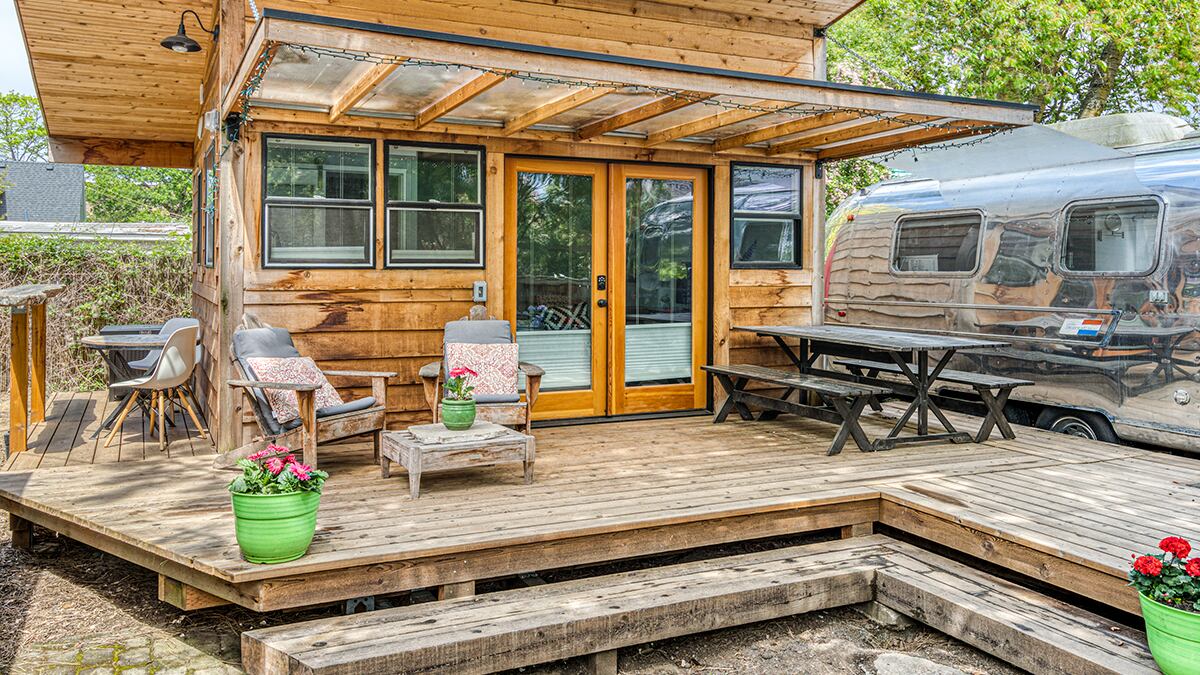Portland startup entrepreneur Amina Moreau wants you to push back your return-to-office plans indefinitely.
And she has good reasons.
After all, for nearly two years, virtually every employed American who could ended up taking their work home to help quell the spread of COVID-19.
What was supposed to be a brief arrangement for cubicle laborers has slowly morphed into a more permanent way of working. Even as business owners set dates when they wanted staffers back at their desks—sans pandemic sweatpants—the coronavirus has always kept its own schedule.
That stark reality created the need for a new type of office—one that is temporary, one that is limited to small groups as the virus continues to surge, and one that doesn’t require 45 minutes in traffic to get to. In other words, if an employed cohort all happened to live in, say, Lents, could those individuals find an alternative to the traditional corporate space where they could collaborate without having to drive across town?
Enter Radious (radious.pro), a company that aims to easily connect people with meeting spaces and workstations with the click of a mouse. Modeled after overnight rental sites like Airbnb—in fact, most of the current hosts have experience with that particular lodging marketplace—the year-old company allows property owners to similarly list everything from their backyard granny flat to an entire five-bedroom house for individuals to book as quiet, solo work retreats or a business to reserve for small team meetings.
“Many employees, even if they do love working from home, after two years of doing it, they’re starting to realize that it’s not the end-all, be-all,” says Moreau. “Sometimes you have to see another person. And sometimes you have to get a change of scenery.”

Being confined to her own home during the early days of the pandemic is partially what inspired Moreau—a former marketing and advertising consultant and filmmaker—to come up with the idea for Radious. But primarily she was motivated by months of missing income normally generated through Airbnb by her downstairs studio apartment.
“I was feeling the pinch,” Moreau explains. “We didn’t feel safe renting it out [overnight]. We were losing income, and so we just thought, ‘How can we get creative and host in a different way that feels safer?’”
Moreau first tested her concept with her own studio by inviting close friends, family and neighbors to tap away on their keyboards there for a few hours at a time. She also worked in the room, assessing everything from the adequacy of the Wi-Fi speed to the comfort of the tabletops.
Not long after those experiments proved promising, Moreau started recruiting hosts through a nonprofit trade association for the short-term rental community and Facebook groups. Her pitch included incentives: Office workers leave less mess to clean once they leave, practically no laundry, and less wear and tear on the property.
“These are working professionals in your home versus just some random traveler who wants to crash at your place,” she explains. “We believe that the renters on our platform are more conscientious and more responsible than in a greater vacationing sort of context.”
So far, those assurances have led dozens of hosts to sign up, with the potential for even more to join now that Radious has rolled out a new feature that syncs its reservation calendar with other rental sites, preventing double bookings.
For relatively new host Maria Grzanka, who has listed the entire first floor of her eclectically decorated home on Radious, joining the program was a financially driven decision. Once her roommate moved out, she didn’t feel comfortable allowing a stranger to take up residence during the pandemic.
“People that I rented the room to have mainly been friends of mine,” says Grzanka. “So, in this case, it seemed more appealing to have somebody I don’t know in and out, and maybe not here forever.”
On the other side of the equation, Moreau adds, is that renters may also feel safer meeting a handful of vaccinated team members in a private dwelling during the outbreak, when crowded coffee shops and coworking spaces can come off as riskier propositions.
But aside from the more serious factors to consider, Radious rentals just flat out look like more fun.
For instance, you can book a board meeting inside a gutted train car—still parked on the rails—that’s now outfitted with a conference table, four sit-stand desks, a kitchenette, restroom and air conditioning. There are also cute tiny homes, multiple covered outdoor courtyards, and even a renovated 1970s Airstream trailer all ready for stuck-at-home office workers looking to venture outside their own four walls.
“It’s about experiences, too, not just productivity,” Moreau says. “Imagine being in a space that’s inspiring and different, and one that makes you want to take selfies in it and send it to your friends to make them jealous that you’re in this really cool space. That’s kind of the point, because the corporate office, most of the time, is a little boring.”
Jobs Issue 2022: A Historic Labor Shortage Is Making Oregon Employers Downright Desperate
We Didn’t Start the Labor Shortage
Oregon Employers Will Put Thousands of Dollars in Your Pocket if You Get Hired
Telehealth Changed Doctor Appointments and We Have the Pandemic To Thank for That
The Cuddling Industry: Supply, Demand and a Statewide Rebound of the Self-employed
Portland-area Startup Radious Found a Better Place to Work From Home: Someone Else’s Home
“Work Won’t Love You Back” Is a Harrowing Read With Hope for the Future

